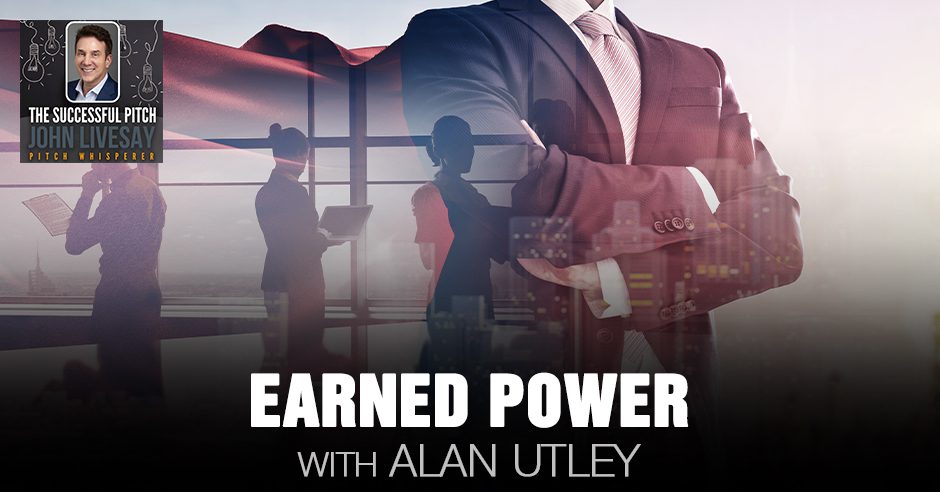Earned Power With Alan Utley
Posted by John Livesay in podcast0 comments

Many promoted leaders are handed token power that runs out. To be a good leader, you need earned power. The show’s guest today is Alan Utley, MBA, a speaker, trainer, and coach who has shaped his career around helping leaders reach for their goals. Alan discusses with John Livesay that you create earned power when you tap your ability to influence. When you’re good at what you do and stay good at it, you build credibility. Join in the conversation and discover the power of leadership that lies inside you. Tune in and unleash your earned power!
—
Listen to the podcast here
Earned Power With Alan Utley
Our guest is Alan Utley, who’s an expert in leadership and HR. We talked about how leaders have earned power, not token power. He has three key elements that make a good leader and how to avoid the struggles that leaders face. He said that, “Leadership needs influence, which needs power.” Enjoy the episode.
—
Our guest is Alan Utley, who’s a San Antonio local. He’s a speaker, trainer and coach who shaped a career around helping leaders reach their goals. Tapping into over twenty years of human resources expertise, working across corporate, nonprofit and academic spaces, Alan consults with emerging leaders and senior executives on topics that range from careers to leadership, to organizational effectiveness. He’s very passionate and optimistic. He’s on a personal mission to help unlock and ignite human potential. He’s an overall interesting, well-educated, smart guy. I’m happy to have him. Welcome, Alan.
I’m not as smart as you made me sound but thank you for doing that. Thank you for having me. I genuinely love what you do. I’m a fan of all your shows. I’m glad to be part of it.
Let’s dive in. If you know, I love to ask about the story of origin. You can take us back to childhood or when you were deciding what you wanted to major in in school. What do you think was the genesis of you becoming you?
I’m going to show you, my inner geek. I love this question because it reminds me of superheroes. I love that they all have an origin story. My favorite part of any superhero story or movie is where they came from. I like it too when you think about it from the perspective of what I do with working with leaders and coaching leaders. I always like to start with who they are, where they came from, their origin, what shaped their career, the people and the experiences that define what kind of a leader they are and who they are. When I think about where I want to go back to, I’m going to go back to sixth grade. I grew up in Texas. For those who also grew up in Texas, you might remember in sixth grade you take Texas History. That’s the History class. We had an individual assignment. The assignment was to tell a story about the Battle of the Alamo.
[bctt tweet=”Your title is token power that runs out. ” username=”John_Livesay”]
The only real instruction was to be creative. I’m sure the teacher was expecting stories or something artistic colored written on paper. Back then, I decided I was going to grow up and become a film director in Hollywood. I’ve got all my friends, even some of my classmates in that same class. I hired my dad for the weekend. We went out and we scouted a bunch of locations that we thought looked like 1800s Texas, which they didn’t but we thought they did. I had the coonskin cap so I became Davy Crockett. We cast everybody. I directed this thing. We spent the weekend telling the story of the Battle of the Alamo. We are talking about a video camera with a VHS cassette inside of it. We would shoot it, we would stop, we would watch it and we would say, “That wasn’t any good.” We rewind it, and then we would record it again.
It was in-camera editing. We made it up as we went along. We thought it was being historically accurate. Who knows if it was or not? When the whole thing was over, I remember getting all my classmates together. We’ve got in front of my dad’s television. We watched it and rolled on the floor laughing at how bad it was. It was terrible. I’ve got an A though so there’s that. I did get an A for the level of effort. We did a sequel, John. We’ve got everybody together a few months later. We said, “We are going to do Texas Rangers.” Like any good sequel, it was a bigger cast. There were more deaths and a bigger budget. It was bigger and better. Why is this significant? When I think back, it was the first time that I took on any kind of leadership role. What inspired me to do it was doing something fun, doing something creative, getting to do something with people and tell a story.
If I think about it, what I was fascinated by back then, the reason I wanted to be involved in movies, acting and I continued acting all the way through high school and college is that I was fascinated with people and human behavior. Eventually, my studies took me into learning about organizational behavior and leadership. I eventually found my way into the human resources world working with leaders and teams, also getting to teach students in a university setting about leadership.
In this HR career professional world and being a practicing leader myself, I have been in a position to help shape leaders and be the best kind of leaders that they can be. It’s more behind the scenes like a director, more of maybe a producer role. I’m not necessarily the business owner or the business leader out there doing it. I’m the guy behind the scenes helping the leader be the best that they can be, focusing on their career, culture, leadership, organizational effectiveness and all these things. That was the beginning of what inspired me to get into what I’m doing now.
I always tell people, you are the movie director of your own life and your career. If you don’t like what’s happening, you can say cut. You can change the location, change the cast. The leaders aren’t very involved with hiring the right cast, the right team. In fact, at Disneyland, they call them cast members so that fits that culture. Let’s go to some basic concepts of what makes a good leader, Alan. Is it different than it used to be?

Earned Power: What makes a great leader is something you have to discover.
Some things are different than maybe they used to be. A perspective that I have gained over the many years working inside organizations and working with leaders across different industries is I have discovered that the leadership struggles are the same. No matter what you do, where you work or what kind of situation you are in. I find that a lot of leaders fall into the same kinds of mistakes, especially new leaders. What makes a great leader is something that they have to discover. I want to talk a little bit about what a new leader runs into. If you think about what gets someone into a new leadership role for the very first time, it’s often a promotion that comes from being a good individual contributor.
For example, if you are a great salesperson, sometimes they go, “We are going to promote you to be the sales director.” You are like, “I have never managed anybody in my life. What do I do?”
If you think about the entrepreneur who has a great idea, who has gotten the investment to start a business, they are going from innovator to actual business leader. In your example of a salesperson, it could be an engineer, an accountant, a marketing person or anybody. They are great at what they do but they haven’t yet proven any kind of leadership capacity. They haven’t necessarily learned how to be a leader and they don’t know what it takes to be a great leader quite yet.
What I find that they all tend to do is access the first thing that they can think of, which is their title. When they need to get something done, they go to that title, which I consider to be what I call token power. It’s bestowed upon them. It’s handed to them from the very beginning. It’s like a crutch. If you have ever used a crutch for a long time, you know that it starts to hurt. What they do is they become the boss. Sometimes they become the mean boss. They haven’t discovered that what made them a great individual contributor and maybe even a great teammate was their hidden ability to influence.
Leadership needs influence. Influence needs power but power is a limited resource. This token power idea is a limited commodity. This is going to be a little cheesy but think of it like a battery. A battery has built-in power. You take it out of the package. It’s ready to go. It’s like handing somebody a title. You’ve got power immediately but like any battery, it’s going to run out eventually. When you have run out of that initial source of power, what are you left with? You have to find another source. Where you have token power, you then have earned power. That is what makes a great leader. You have to discover and understand that to lead people and people can choose who they want to follow, you need to tap into your ability to create influence by creating power.
[bctt tweet=”Leaders need influence which requires earned power. ” username=”John_Livesay”]
Earned power comes from people respecting you first, not because of your title but they respect you as a person. Probably you have respected them as people and individuals so they return the respect. It’s not something you can demand, “You must respect me.” Unless you are maybe the king or something of a country or playing that character. If leaders would realize that if they show their team respect, then the team will respect them, which then gives them some earned power as opposed to demanding it or its token. “You must respect me because I have this title.”
I will never forget once I’m working for someone who was in the publishing industry. She went from ad director to associate publisher. I happened to be in her office when her new business cards arrived. You would have thought she won the lottery. She was so excited about it. I was looking at her like, “I don’t get it.” I was never motivated by that. That was a big goal for her to be able to say, “I’m an associate publisher. I’m on my way to becoming a publisher.” I was like, “Congrats.” It was so odd to watch somebody in their own internal head. It had nothing to do with, “Therefore I can make a better difference.” It was all about her and her need to feel okay based on that power. What else can a leader do to earn power besides giving respect first?
I’m in 100% agreement with you about respect. I break it down into three components for me that makes the most sense. One is simply being good at what you do. You’ve got to have that built-in credibility. Most people will have that. They’ve got promoted because they were good at what they do but they have to stay good. They also have to be good at managing, which everyone will agree that management and leadership are two different things. You’ve got to be good at that. You have to be trustworthy. For me, that’s being transparent about what you are trying to do. It’s being transparent about your agenda and not being manipulative. Not trying to play games and work an angle to get somebody to do something.
Let me think of an example of that. Let’s say if someone says, “We are going to have to have some layoffs but when the layoffs are over, that’s going to be it. We won’t do it again for the rest of the year.” Three months later, they have another round of layoffs. You have lost trust. Even if it was your intention and you didn’t know you were consciously lying, you would still have lost that trust factor because that’s the biggest disruption that people are always afraid of.
They often may have said that too because they wanted to keep that individual engaged and motivated, keep them from living on their own. They gave them this false sense of security, whereas if you had simply said, “Times are tough. We need to weather the storm. We need to make some big changes. I want you to be part of the solution. I need you to help me not be in this situation again. We could get here again but if you stick it out with me, imagine the possibilities.”

Earned Power: Be good at what you do because you need to have that built-in credibility.
Let’s jump back to what you said in some cases people go like, “Leading and managing, I would love a distinction.” Leaders earn power. Managing people, that’s a lot more day-to-day stuff. “You are not coming in on time. You are not delivering your projects on time. How do you handle that?” Is that an example of managing?
It is and thank you for going back to that. It’s about planning, organizing and controlling. I’m referencing a leadership and management concept that John Kotter wrote about many years ago. You think about management as short-term, leadership as long-term. Management is about being clear about what people need to do when they show up. “I’ve got a business. I have a job that I need to get done. I’m going to hire John to do that job. I’m going to be clear about his roles, expectations, responsibilities and what time to show up to work every day.” It’s about how you churn the machine to keep the business running. Leadership is the inspirational piece, the vision piece, the human aspect.
A lot of people are stuck in the weeds and they don’t ever express their vision. People feel like they are being micromanaged without any vision of what life could be for the company, them or anything. You need both. You can’t just give a vision without expectations. I remember hearing a story of a company hiring young people right out of college and getting so mad at them that they would show up at 9:30, 10:00. They said, “What time did you tell them?” “We didn’t.” They did an internship where people could stroll in whenever they want, as long as they’ve got the work done or they worked late. If your culture is different if you haven’t expressed that and expect because your generation showed up at 9:00 AM on the dot, is that important here depending on the jobs? Are the phones getting unanswered? Are they doing software development that no one is wondering where they are?
The other phrase I have heard so many times and I would love your expert opinion on is hire slow and fire fast. Many people go, “We’ve got a job opening. Let’s fill that as fast as we can,” especially if it’s a sales opening. “We don’t lose a lot of revenue and have that territory open too long.” They rush and they get somebody who doesn’t perform or isn’t a good cultural fit. They are like, “Let’s give them another chance way past the 90-day mark because we don’t want to go through that process again.” It takes a lot of emotional intelligence to wait for the right person, as well as confronting the awkward. “I made a mistake.” Let somebody go sooner than later. What are your thoughts on all of that?
I am familiar with that concept as well. I have been known to repeat it to many people and leaders because they have made a quick decision that ultimately didn’t pay off and then you need to part ways with them quickly. I thought about this. There needs to be a caveat. In the environment that we are in, companies need people. I think that people are being a little more careful. They are scrutinizing their options more and they have a choice of where they go to work. What we are dealing with is this war on talent. If we wait too long to hire somebody, then we are going to lose them because someone else is going to pick them up. I’m not saying hire the first person that comes along. I’m saying hire the first person that seems to be a great fit that you know is a talent. Don’t spend the time saying, “I have only interviewed one person. He’s great or she’s great but I need to look at least 5 or 6 other people before I make this decision.” If you’ve got a burden at hand, run with it.
[bctt tweet=”All superheroes have an origin story. ” username=”John_Livesay”]
It’s like buying a house. It’s either a buyer’s market or a seller’s market. If you find your dream house, it is probably not going to be around next week or there’s going to be multiple offers sooner than later. It’s a seller’s market with homes. There’s a shortage of homes. Buyers are bidding over asking. That can happen with talent, where people are having trouble finding good talent. Is there a big mistake that you see leaders make, whether they are new or not, on keeping talent? Is it that they are not giving them a vision of what their career could be and that they are not investing in helping them get new skills or they take them for granted as any relationship can happen? What’s the mistake you see people have that causes people to leave for a few thousand dollars more somewhere else?
That tells nicely to the third element that you need to earn influence and to earn the right to lead people. You are going to laugh and your readers are going to laugh at how simple this is but its likeability.
I won’t laugh at that. I have done a whole interview with Tim Sanders on his likeability book.
A little bit about me, I have always been the boy next door or the good influence for my friends. My friend’s parents would always say, “Hang out with that kid because he’s a good kid.” Even as an adult, some of my friends call me Mr. Nice guy. It’s because I believe in bringing this human element into the equation. That gets to the respect concept that you shared before. I have found that a lot of people disagreed strongly with this concept. I love your perspective on it too. I remember training a group of leaders talking about power, talking about influence and how to be a good leader. I shared this idea of likeability. I had one particularly vocal leader stand up. He was newish as a leader but he stood up and said, “I do not buy into that concept. I need to be respected or feared. I don’t need to be liked.” It gave me a pause. I spent time thinking, “Why is that. What’s so wrong with being a nice person? What’s so wrong with likeability?” I’m curious about your thoughts on this.
I have a couple of thoughts. One is this great phrase that people don’t leave their jobs, they leave their boss. It’s because they can’t tolerate that behavior, whether it’s micromanaging, outbursts, lack of empathy or whatever it is going on. Tim Sanders’ book The Likeability Factor shows research that doctors spend more time with patients they like, teachers spend more time with students they like. Your biggest way to up your likeability factor is to simply show empathy. It doesn’t mean you are weak. It doesn’t mean you let people walk all over you.

Earned Power: Long-term management is being clear about what people need to do when they show up.
I have worked for people and I have been fortunate enough to work for some wonderful bosses. Alice Alston, Nina Lauren comes to mind. They liked all of the people on their team so much. I liked and respected them. They certainly had their credibility. You go the extra mile for them when you like somebody. Your job requirement is just to do this and they need a favor. “Can you ask your client to move an ad from this month to another month?” You can go, “I asked them. They said no,” not even do it. They would never know because they don’t have the time to manage that many people and get in the weeds that much. You are like, “Let me try.” You are doing something for the team and because you want them to look good. They are sharing their goals with you and you see your part of being the big picture.
People work harder for people they like, as opposed to resenting people or being afraid of that. Let’s face it. We cannot stay in a fight or flight mode. We burn out. We are like, “I’m going to grind this out for the next year or until something better comes along.” You know this. People are like an actor. You have this framework in your age range, in your career. I would say 25 to 35 for actresses and actors. That’s the lead role. You have your first break and then you get the next one. You age out of being the rom-com guy as Matthew McConaughey talks about in Greenlights. He decided to reinvent himself. It’s the same thing in sales. You become Willy Loman, Death of a Salesman if you don’t get into management or you don’t reinvent yourself somehow.
Trying to stay in something and not grow is the kiss of death but within that framework, when you are being wooed all the time to, “Come work here. You’ve got enough experience and not too much that we can’t afford you.” Are you going to be wooed away with a few thousand dollars more because you are so young and naive you don’t do the math and go, “After taxes, that $5,000 bump is only whatever it is per paycheck? Maybe I’m jumping into something that I won’t like the people.” I’m like, “I would miss my coworkers and my boss too much and the flexibility they have shown me or when I had a tragedy and I needed some extra time off, they were there for me.” All those little things, you can never undervalue, in my opinion. That’s my long answer to your question of why I agree with you about likeability.
You have touched on so many things that I want to talk about. I talked about being Mr. Nice guy. You hear the phrase, “Nice guys finish last.” I think we need to rephrase this.
Tim Sanders says, “Nice smart people finish first.”
[bctt tweet=”Velvet hammer leaders can make somebody feel responsible in the right way for something that they did.” username=”John_Livesay”]
I love this guy. The idea is that people who believe in this non-likeability idea believe that civility calls it respect, call it kindness and accountability are on opposite ends of the same spectrum. They believe that you can’t hold someone accountable and also be nice about it. I strongly disagree. They are running on two different spectrums in parallel and it is possible. I have worked with people who we call the velvet hammer, who have the ability in one conversation to make somebody feel responsible in the right way for something that they did and will say thank you.
This person has fired people for not performing. They have hugged them, cried with them and thanked them for the experience, the opportunity and the honest feedback. That kind of skill is what we all should aspire to. This whole idea of civility is so important. That’s what we need to bring back into leadership. That is what the workplace needs. It’s this humanity, civility. It gets to people being willing to make sacrifices and be vulnerable.
When someone wants to work with you, they are either a new leader or they are looking for new leadership skills to stay current. Credibility is not forever and that because you had your heyday years ago, you still need to be keeping your skills up and learning new things to stay a better leader. What’s the best way for someone to know if you are the right executive coach for them? Who’s your ideal client? When do you love to work with people?
I spent some time thinking about this as well. I have worked with the emerging leader to the senior executive. I enjoy the space of working with someone newish to leadership or someone who needs to renew their leadership. Someone who has been doing it for a while and has found that they want to reinvent themselves or they have lost a passion, maybe they need to get refreshed on what does it mean to lead, what are these Millennials like and whatever behind Millennials is called. For me, the right kind of client is somebody who isn’t in a place where they want to be better. They recognize there is some opportunity, some skills and gaps to fill in. What I don’t do is try to teach them and tell them, “Here’s how to lead. Here’s what you need to do.”
The value that I offer is not in the advice that I give. It’s in the questions that I ask. A good coaching experience is about self-discovery. John, if you and I were working together, we would first spend time getting to know you. Who are you? What makes you tick? What got you to where you are? It would be about discovering what your passions are, what your strengths are and what are the areas that you feel like you are not being most effective? We would look for ways to fill in those gaps. We would find resources and people. We would have conversations. We would talk about real-life scenarios. “Let’s talk about this week. What did you do this week? What are the conversations you had? Why did you approach that situation in the way that you did?”

Earned Power: If you wait too long to hire somebody, you’ll lose them because someone else will pick them up.
“What did you get so triggered?”
“What could you have said or done differently? What other options do you have?” It’s about creating intentionality about how we lead every day.
What’s the best way to reach out to you? Do we connect with you on LinkedIn or your website for people to go to?
They can find me on LinkedIn. You can email me directly at [email protected]. You can find me on Facebook. Look for AD Utley Consulting. They can find some of my writing about leadership if they go to LeadChangeGroup.com. That’s not my website. It’s its own thing. They have guest writers so search for my name and you will find my articles.
Any last thought or favorite quote you want to share?
[bctt tweet=”A good coaching experience is about self-discovery. ” username=”John_Livesay”]
My favorite quote of all time is from John F. Kennedy. It’s that, “Leadership and learning are indispensable to each other.”
Readers are leaders is another way of saying that. Alan, thanks for sharing your expertise and your passion for helping make us all better leaders of our own life, whether we are managing people or not.
It’s my pleasure. Thanks for having me, John. This was fun.
Important Links
- The Likeability Factor
- Tim Sanders – Past Episode
- Greenlights
- LinkedIn – Alan D Utley
- [email protected]
- AD Utley Consulting – Facebook
- LeadChangeGroup.com
- https://LeadChangeGroup.com/3-secrets-of-great-leadership-in-3-seconds/
- Better Selling Through Storytelling Method Online Course
Wanna Host Your Own Podcast?
Click here to see how my friends at Podetize can help
Purchase John’s new book
John Livesay, The Pitch Whisperer
Share The Show
Did you enjoy the show? I’d love it if you subscribed today and left us a 5-star review!
- Click this link
- Click on the ‘Subscribe’ button below the artwork
- Go to the ‘Ratings and Reviews’ section
- Click on ‘Write a Review’
Love the show? Subscribe, rate, review, and share!
Join The Successful Pitch community today:
- JohnLivesay.com
- John Livesay Facebook
- John Livesay Twitter
- John Livesay LinkedIn
- John Livesay YouTube
Tags: civility, influence, likeability, management, respect, token power
